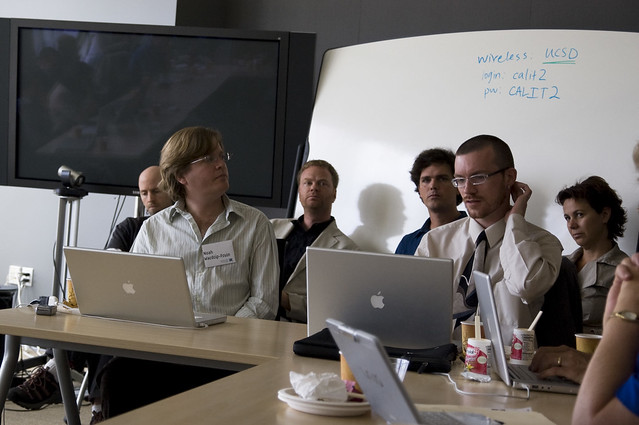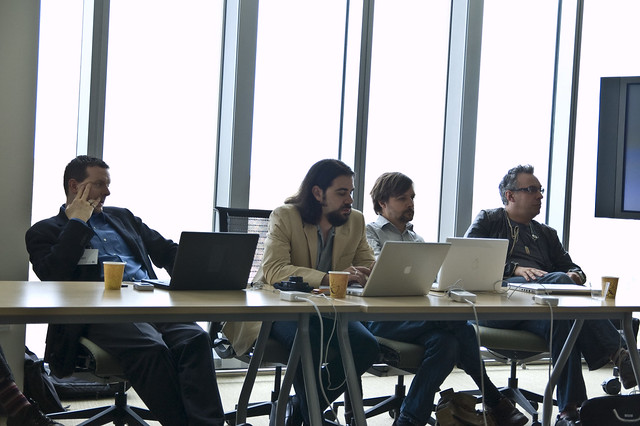Day two of SoftWhere 2008 was an invite-only strategy round-table session that aimed to address several questions on the formation of a new field of studies.
What is Software Studies?
Is it an intellectual movement, a paradigm, a school or field? According to the Software Studies ![]() Initiative directors Lev Manovich and Noah Wardrip-Fruin it is whatever we want it to be. It is what it is already but it is now getting an official name with the recently published book. The Software Studies lexicon, edited by Matthew Fuller, is coming out with MIT Press this month and marks a milestone in the field. Unfortunately Matthew Fuller, from Goldsmiths College, University of London was not able to attend to attend the meeting in California but the people present represented a wide variety of interests.
Initiative directors Lev Manovich and Noah Wardrip-Fruin it is whatever we want it to be. It is what it is already but it is now getting an official name with the recently published book. The Software Studies lexicon, edited by Matthew Fuller, is coming out with MIT Press this month and marks a milestone in the field. Unfortunately Matthew Fuller, from Goldsmiths College, University of London was not able to attend to attend the meeting in California but the people present represented a wide variety of interests.
MIT Press was represented by Doug Sery who is involved with the MIT Software Studies series. Through these series MIT wishes to direct the discussion and with their Platform Studies series they want to provide a complementary insight into the field of computing, software and hardware. One of the questions that arises is where is the place of webware? Does it belong to platform studies or software studies? Another issue that we need to address is how we can use, create and learn from new modes of knowledge formation that go beyond books. How do we make, use and contribute to the growing field of software studies besides the official MIT series?
The Software Studies Initiative presented their first plan on establishing a central platform for researchers, students, engineers and everyone interested in the state of software studies. One way to accomplish this is to form an aggregation channel where everything produced will be aggregated in one central place. This may be done by using the “software_studies” tag when publishing your related work on Flickr, Vimeo, YouTube, blogs, etc. We are participating in the discourse by tagging which in itself is a technological strategy. The tools we use as both an object of study and to document our studies are going to be very diverse and on top of that we are people who switch tools often. This is why tagging was chosen as one of the main ways to aggregate content because tagging is a meta practice and usually independent of the type of tool. A first aggregation prototype was made by Jeremy Douglass in Yahoo Pipes.

However, when tagging “user generated content” such as blog posts or videos one has to be aware of the both the tag and the field. As a fairly new and emerging field that is in the process of shaping itself there will be a lot of people doing interesting research related to a field they are not aware of. I think one of the key objects should also be expanding the awareness of the field where the Software Studies lexicon is playing a leading role.

An important step in further shaping and expanding the field is an international approach. The first Software Studies Workshop was held at the Piet Zwart Institute in Rotterdam, the Netherlands in 2006. This second workshop at the University of San Diego attracted mostly people from the United States from UCSD & UCSC but also people from MIT, Georgia Institute of Technology, University of Maryland, etc. International representation included Tristan Thielmann from the University of Siegen, Germany, Cicero Silva from FILE, Brazil and myself. Silva recently opened the Software Studies Brazil at the FILE lab and translated a section of the Software Studies Portal into Portugese.
With the Piet Zwart Institute in Rotterdam, the University of Amsterdam and the Institute of Network Cultures in Amsterdam, Goldsmiths College in London a European branch is unofficially present as well. It would be interesting to see what is happing in Scandinavia, Germany, Italy and Spain for example. Another interesting direction to explore would be China but due to language and cultural barriers this may be a step too far too soon.
The main communal feature of this group is technical engagement. This also raised the reoccurring question of digital literacy or, should we all know (and teach) how to program? Personally I do not consider myself a coder. I once called myself a passive coder as a way to illustrate that I can read bits of code and write new code through the practice of copy and pasting but I am not an active coder in the sense that I can write code from scratch. In this age of appropriation, copy-pasting I think it is important to know your object of study, which in the case of software will often involve knowing code, but interpreting code and writing code are two different things. Digital literacy to me means to understand code, not to be able to produce code (although I wish I could but that is another issue.)
A final question that was addressed in the California Institute for Telecommunications and Information Technology (Calit2) meeting room was that we are located in the heart of where things get made. In California a lot of the objects we study gets made and how do we establish relations with for example Google and Yahoo? How do we establish more open and fluid relations with those who produce our objects of study?
One thought on “SoftWhere 2008: Software Studies Strategy Round-Table”